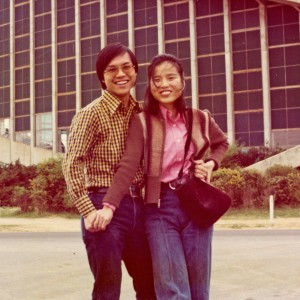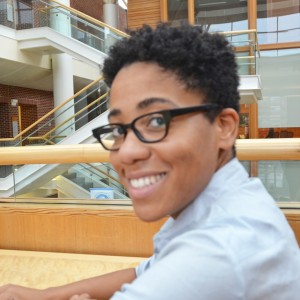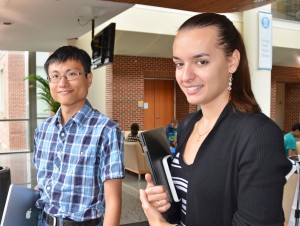Q&A with Chen-Yu Yen
December 7, 2015
In August 2015, Crystal Hinson Miller, MA, CFRE, associate dean for advancement at the UNC Gillings School, sat down to chat with Chen-Yu Yen, PhD, and his wife, Ray-Whay. Dr. Yen, a 1983 alumnus and current member of the School’s Public Health Foundation board, and his wife have made a significant gift to the School to support international students – the Chen-Yu and Ray-Whay Yen Expendable Graduate Fellowship.
Crystal Hinson Miller: Tell us about your experiences as international students.
Chen-Yu Yen: The opportunity to get a top-notch education was the most important reason that we came from Taiwan to the U.S. in the 1970s. UNC-Chapel Hill was renowned in the fields we had chosen to study. The UNC Department of Chemistry gave me a teaching assistantship, without which I would not have been able to attend graduate school abroad, and we were lucky that the N.C. State University Department of Genetics offered Ray-Whay a position so that she could join me. Without financial assistance, we would not be here today. This is part of the reason we set up a fellowship for international students at the Gillings School.
Starting a life in a foreign country was a challenge on multiple fronts, including language, transportation, diet and having to live in different cities (Chapel Hill and Raleigh). Language was definitely a challenge. I thought I knew English well until I was confronted with the southern drawl! We could not get anywhere without a car, and neither of us had driven before. Friends supported us every step of the way, helping us buy a car and get licenses, and teaching us to drive.
When our son was born in 1979, people again stepped up to help. Friends helped us enroll in the Women, Infants and Children (WIC) program. We were thoroughly educated about good nutrition and steered to eat the right kinds of food. We used WIC coupons to sample foods (e.g., cheese) that we otherwise would not have been able to afford.
We spent almost eight years in North Carolina. There were many fond memories. We enjoyed tremendous hospitality, and a lot of people helped us. For that, we’re grateful.
Miller: How did financial support make a difference in your UNC public health studies?
Yen: In my second year as a UNC chemistry doctoral student, I took a course in modeling of natural systems, taught by Professor Charlie O’Melia. It was fascinating, and Charlie was a great teacher who made complicated material much easier to understand. I wrote my term paper about a study on the greenhouse effect, claiming that the authors made a slight mathematical error, and their projections likely overestimated the warming effect. Risking my credibility was daring, but I got an H [high pass] in the course. More importantly, I was hooked. I switched my major to environmental sciences and engineering [ESE], an area in which I believed I could make a difference.
I talked with the ESE department chair and thought I had secured a research assistantship, but an administrative error caused that not to happen. Given my financial situation and status as an international student, I could not legally work without being a full- time registered student. I told Professor O’Melia my situation. He kindly introduced me to Professor Phil Singer [now distinguished professor emeritus]. At the time, Phil had a large Department of Energy grant. With his help, I squeezed in as the last member of his team. I am forever grateful to both Charlie and Phil. They were terrific models for young aspiring students, and they served as unselfish, caring mentors for all of us.
Miller: What led you to establish a fellowship in ESE?
Yen: Personally, we had so much to be thankful for during our years in N.C. – and having financial support along the way provided us with many opportunities.
In general, we should support graduate studies in environmental sciences and engineering. Even the best of our researchers will not earn the lucrative salaries of someone in business, medicine or law. We need to prevent these students from being saddled with student loans so they can focus on their studies and work to make our world cleaner and greener.
Miller: What inspires you to give?
Yen: Some might blame our happy brain chemicals! Seriously, the only times you truly can appreciate the joy of giving are when you are giving or receiving. My theory is that people who have experienced being the beneficiaries of help tend to be willing to give it. It was our fortune to be on the receiving end in our early lives. I believe we should give back when we have the resources to do so.
Miller: You mentioned that you were mentoring at least one young alumnus in philanthropy. What motivated you to do this?
Yen: I believe people make charitable gifts based on their ability to ‘replenish the coffer,’ that is, to keep themselves comfortable while sharing their wealth. We began a nonprofit, InvestWithYen.org, founded on the notion that charitable people should be better educated in investing. In this way, they assure their own financial security and are able to donate portions of their profits to causes they believe in.
Through a process of training-by-doing, individuals graduate and ‘spread the gospel’ about charitable giving. In this way, our nonprofit not only helps create individual wealth; we also help develop social awareness and action in those who will make the world a better place.
What motivated us to do this? Why else do we live this precious life? We only live once, and we cannot take any wealth with us.
Miller: What impact do you want your giving to have upon your legacy?
Yen: We envision a world in which talented, educated people can become better stewards for our planet. We were born and reared by loving parents; guided by caring and inspiring mentors; and educated in well-established institutions such as UNC’s Gillings School. The world faces many challenges. We need bright, highly educated and socially conscientious people to help us overcome these challenges. We are only doing our small part, but we hope to inspire others to do the same.
Sarah Long, first-year master’s student in environmental sciences and engineering, is working to become a researcher and consultant for the global water, sanitation and hygiene (WaSH) sector, focusing on underserved communities in the U.S. and abroad. After earning an undergraduate degree in civil and environmental engineering at Cornell University, she took part in water development projects in rural communities in Honduras and India and co-founded a company dedicated to disseminating sustainable drinking water treatment technology.
Long is the inaugural recipient of the Chen-Yu and Ray-Whay C. Yen Expendable Graduate Fellowship.
Financial support benefits all students, both local and global.
.
As Gillings School alumnus Chen-Yu Yen, PhD, describes, life as an international student in the U.S. can be challenging – and expensive.
Below are profiles of two doctoral students whose financial support was instrumental in their coming to the Gillings School. Both study in Yen’s field – environmental sciences and engineering – and both received support from the B.B. Parker Environmental Science and Engineering Fund, established to honor the late Bill Ben Parker, UNC alumnus and former president and chief operational officer of Duke Energy Progress.
Alma Beciragic was born in Zagreb, Croatia. In 1994, she and her family came to Charlotte, N.C., as refugees from Bosnia and Herzegovina. Two decades later, she completed an undergraduate degree in environmental science and chemistry at Queens University in Charlotte.
At the Gillings School, she works in the lab of Associate Professor Howard Weinberg, PhD, conducting research about the safety of membrane processes for water reuse and purification.
“My undergraduate work sparked my interest in water quality research and safeguarding public health,” says Beciragic. “Those experiences – and ones that are continuing here at UNC – have helped me see how complex the field of water quality is.”
Beciragic hopes to teach at a university after earning her doctorate.
“The B.B. Parker Award has facilitated my pursuit of graduate education,” she says. “Without it, the financial burden would have been too great, and I could not have come to the Gillings School. The award has opened so many doors for me, and I will always be grateful for that.”
Chien-Hsiu Weng earned a bachelor’s degree in chemistry and public health, with a minor in political sciences, at National Taiwan University in Taiwan and a master’s degree in public health at Tulane University.
He works in the Gillings School lab of Associate Professor Jacqueline MacDonald Gibson, PhD, studying risks related to antibiotic-resistant bacteria.
Chien-Hsiu’s interest in the environment is tied to his native land.
“Taiwan is a populous island with few regulations and policies for managing land use,” he says. “Natural resources are precious and essential for maintaining the balance of Earth’s ecosystems. I love experiencing nature, so I value keeping those resources intact.”
Chien-Hsiu says he’s appreciative of the School’s financial aid. “The award is an affirmation of my work that encourages me along the path of academics,” he says.
– L.K.
Carolina Public Health is a publication of the University of North Carolina at Chapel Hill Gillings School of Global Public Health. To view previous issues, please visit sph.unc.edu/cph.



